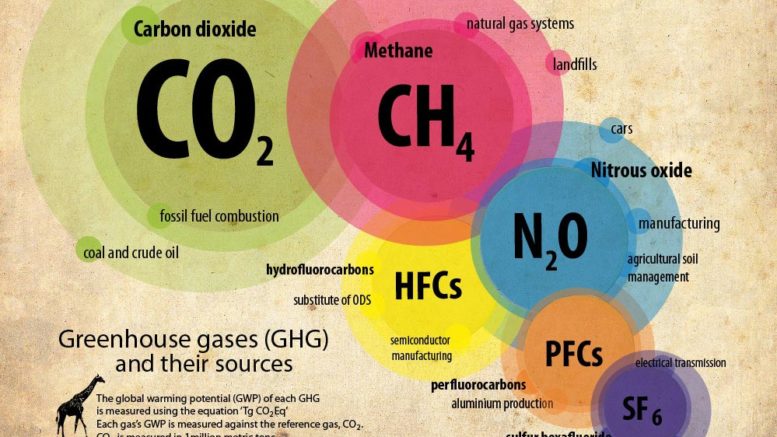
This all happened because the NWO promoters needed a global problem to promote funding, and what better than the weather? Once you understand motive, all behavior becomes rational. Thus we have the linking of CO2 rise to Human causation. It was too useful to allow a challenge.
CO2 never was a Greenhouse Gas and neither is methane either for that matter. What is true is that the long Bronze Age global temperature regime which was at least one degree warmer, went into decline because human agriculture desertified the entire Sahara and the whole of semi tropical Asia. This can all be completely restored and all crop lands can also be essentially retimbered in spaced rows that provide partial shade and superior growing conditions.
This will increase global temperatures by about one degree, but also make substancial croplands much more temperate as they need to be....
Tim Ball: The Evidence Proves That CO2 is Not a Greenhouse Gas
Written By: Dr. Tim Ball September 13, 2018
https://www.technocracy.news/tim-ball-the-evidence-proves-that-co2-is-not-a-greenhouse-gas/
The CO2 error is the root of the biggest scam in the history of the world, and has already bilked nations and citizens out of trillions of dollars, while greatly enriching the perpetrators. In the end, their goal is global Technocracy (aka Sustainable Development), which grabs and sequesters all the resources of the world into a collective trust to be managed by them. ⁃ TN Editor
The Intergovernmental Panel on Climate Change (IPCC) claim of human-caused global warming (AGW) is built on the assumption that an increase in atmospheric CO2 causes an increase in global temperature. The IPCC claim is what science calls a theory, a hypothesis, or in simple English, a speculation. Every theory is based on a set of assumptions. The standard scientific method is to challenge the theory by trying to disprove it. Karl Popper wrote about this approach in a 1963 article, Science as Falsification. Douglas Yates said,
“No scientific theory achieves public acceptance until it has been thoroughly discredited.”
Thomas Huxley made a similar observation.
“The improver of natural knowledge absolutely refuses to acknowledge authority, as such. For him, skepticism is the highest of duties; blind faith the one unpardonable sin.”
In other words, all scientists must be skeptics, which makes a mockery out of the charge that those who questioned AGW, were global warming skeptics. Michael Shermer provides a likely explanation for the effectiveness of the charge.
“Scientists are skeptics. It’s unfortunate that the word ‘skeptic’ has taken on other connotations in the culture involving nihilism and cynicism. Really, in its pure and original meaning, it’s just thoughtful inquiry.”
The scientific method was not used with the AGW theory. In fact, the exact opposite occurred, they tried to prove the theory. It is a treadmill guaranteed to make you misread, misrepresent, misuse and selectively choose data and evidence. This is precisely what the IPCC did and continued to do.
A theory is used to produce results. The results are not wrong, they are only as right as the assumptions on which they are based. For example, Einstein used his theory of relativity to produce the most famous formula in the world; e = mc2. You cannot prove it wrong mathematically because it is the end product of the assumptions he made. To test it and disprove it, you challenge one or all of the assumptions. One of these is represented by the letter “c” in the formula, which assumes nothing can travel faster than the speed of light. Scientists challenging the theory are looking for something moving faster than the speed of light.
The most important assumption behind the AGW theory is that an increase in global atmospheric CO2 will cause an increase in the average annual global temperature. The problem is that in every record of temperature and CO2, the temperature changes first. Think about what I am saying. The basic assumption on which the entire theory that human activity is causing global warming or climate change is wrong. The questions are how did the false assumption develop and persist?
The answer is the IPCC needed the assumption as the basis for their claim that humans were causing catastrophic global warming for a political agenda. They did what all academics do and found a person who gave historical precedence to their theory. In this case, it was the work of Svante Arrhenius. The problem is he didn’t say what they claim. Anthony Watts’ 2009 article identified many of the difficulties with relying on Arrhenius. The Friends of Science added confirmation when they translated a more obscure 1906 Arrhenius work. They wrote,
Much discussion took place over the following years between colleagues, with one of the main points being the similar effect of water vapour in the atmosphere which was part of the total figure. Some rejected any effect of CO2 at all. There was no effective way to determine this split precisely, but in 1906 Arrhenius amended his view of how increased carbon dioxide would affect climate.
The issue of Arrhenius mistaking a water vapor effect for a CO2 effect is not new. What is new is that the growing level of empirical evidence that the warming effect of CO2, known as climate sensitivity, is zero. This means Arrhenius colleagues who “rejected any effect of CO2 at all” are correct. In short, CO2 is not a greenhouse gas.
The IPCC through the definition of climate change given them by the United Nations Framework Convention on Climate Change (UNFCCC) were able to predetermine their results.
a change of climate which is attributed directly or indirectly to human activity that alters the composition of the global atmosphere and which is in addition to natural climate variability observed over considerable time periods.
This allowed them to only examine human-causes, thus eliminating almost all other variables of climate and climate change. You cannot identify the human portion if you don’t know or understand natural, that is without human, climate or climate change. IPCC acknowledged this in 2007 as people started to ask questions about the narrowness of their work. They offered the one that many people thought they were using and should have been using. Deceptively, it only appeared as a footnote in the 2007 Summary for Policymakers (SPM), so it was aimed at the politicians. It said,
“Climate change in IPCC usage refers to any change in climate over time, whether due to natural variability or as a result of human activity. This usage differs from that in the United Nations Framework Convention on Climate Change, where climate change refers to a change of climate that is attributed directly or indirectly to human activity that alters the composition of the global atmosphere and that is in addition to natural climate variability observed over comparable time periods.”
Few at the time challenged the IPCC assumption that an increase in CO2 caused an increase in global temperature. The IPCC claimed it was true because when they increased CO2 in their computer models, the result was a temperature increase. Of course, because the computer was programmed for that to happen. These computer models are the only place in the world where a CO2 increase precedes and causes a temperature change. This probably explains why their predictions are always wrong.
An example of how the definition allowed the IPCC to focus on CO2 is to consider the major greenhouse gases by name and percentage of the total. They are water vapour (H20) 95%, carbon dioxide (CO2) 4%, and methane (CH4) 0.036%. The IPCC was able to overlook water vapor (95%) by admitting humans produce some, but the amount is insignificant relative to the total atmospheric volume of water vapour. The human portion of the CO2 in the atmosphere is approximately 3.4% of the total CO2 (Figure 1) To put that in perspective, approximately a 2% variation in water vapour completely overwhelms the human portion of CO2. This is entirely possible because water vapour is the most variable gas in the atmosphere, from region to region and over time.
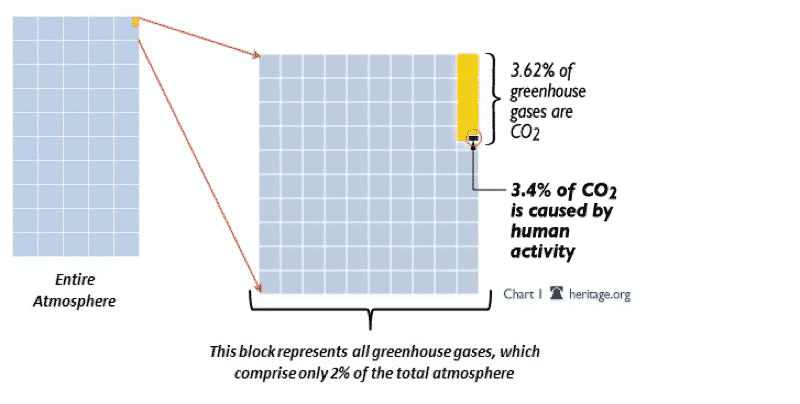
Figure 1
In 1999, after two IPCC Reports were produced in 1990 and 1995 assuming a CO2 increase caused a temperature increase, the first significant long term Antarctic ice core record appeared. Petit, Raynaud, and Lorius were presented as the best representation of levels of temperature, CO2, and deuterium over 420,000-years. It appeared the temperature and CO2 were rising and falling in concert, so the IPCC and others assumed this proved that CO2 was causing temperature variation. I recall Lorius warning against rushing to judgment and saying there was no indication of such a connection.
Euan Mearns noted in his robust assessment that the authors believed that temperature increase preceded CO2 increase.
In their seminal paper on the Vostok Ice Core, Petit et al (1999) [1] note that CO2 lags temperature during the onset of glaciations by several thousand years but offer no explanation. They also observe that CH4 and CO2 are not perfectly aligned with each other but offer no explanation. The significance of these observations are therefore ignored. At the onset of glaciations temperature drops to glacial values before CO2 begins to fall suggesting that CO2 has little influence on temperature modulation at these times.
Lorius reconfirmed his position in a 2007 article.
“our [East Antarctica, Dome C] ice core shows no indication that greenhouse gases have played a key role in such a coupling [with radiative forcing]”
Despite this, those promoting the IPCC claims ignored the empirical evidence. They managed to ignore the facts and have done so to this day. Joanne Nova explains part of the reason they were able to fool the majority in her article, “The 800 year lag in CO2 after temperature – graphed.” when she wrote confirming the Lorius concern.
“It’s impossible to see a lag of centuries on a graph that covers half a million years, so I have regraphed the data from the original sources…”
Nova concluded after expanding and more closely examining the data that,
The bottom line is that rising temperatures cause carbon levels to rise. Carbon may still influence temperatures, but these ice cores are neutral on that. If both factors caused each other to rise significantly, positive feedback would become exponential. We’d see a runaway greenhouse effect. It hasn’t happened. Some other factor is more important than carbon dioxide, or carbon’s role is minor.
Al Gore knew the ice core data showed temperature changing first. In his propaganda movie, An Inconvenient Truth he separated the graph of temperature and CO2 enough to make a comparison of the two graphs more difficult. He then distracted with Hollywood histrionics by riding up on a forklift to the distorted 20th century reading.
Thomas Huxley said,
“The great tragedy of science – the slaying of a lovely hypothesis by an ugly fact.”
The most recent ugly fact was that after 1998 CO2 levels continued to increase but global temperatures stopped increasing. Other ugly facts included the return of cold, snowy winters creating a PR problem by 2004. Cartoons appeared (Figure 2.)
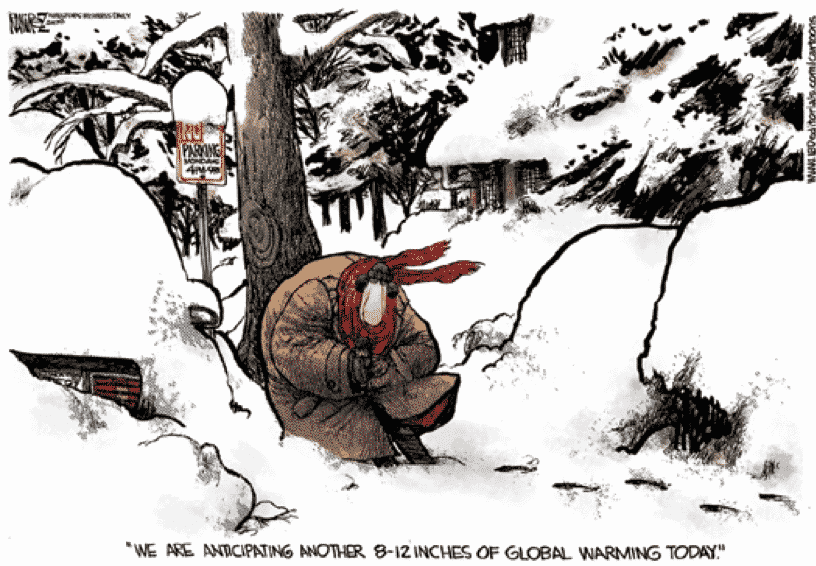
Figure 2
The people controlling the AGW deception were aware of what was happening. Emails from 2004 leaked from the University of East Anglia revealed the concern. Nick at the Minns/Tyndall Centre that handled publicity for the climate story said,
“In my experience, global warming freezing is already a bit of a public relations problem with the media.”
Swedish climate expert on the IPCC Bo Kjellen replied,
“I agree with Nick that climate change might be a better labelling than global warming.”
The disconnect between atmospheric CO2 levels and global temperatures continued after 1998. The level of deliberate blindness of what became known as the “pause” or the hiatus became ridiculous (Figure 3).
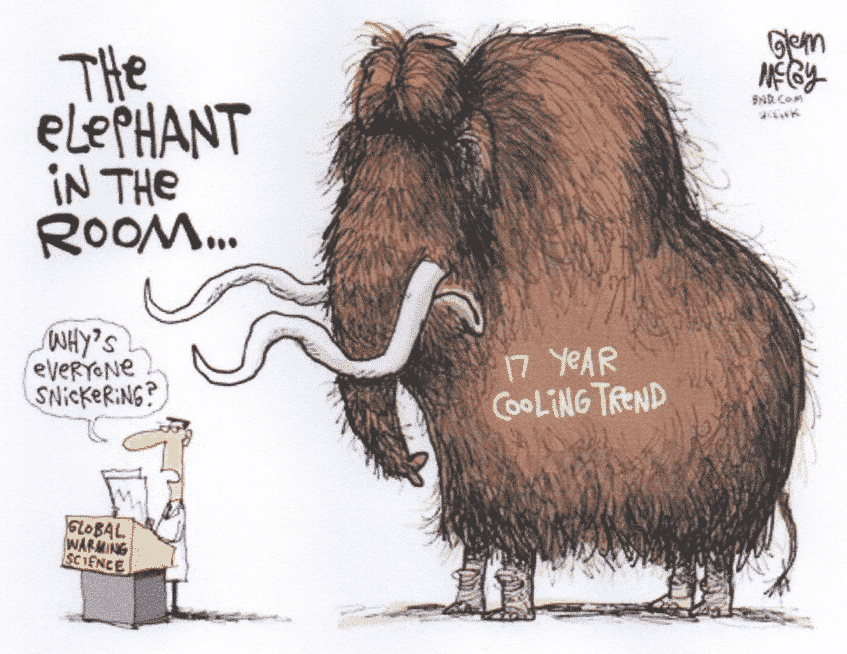
Figure 3
The assumption that an increase in CO2 causes an increase in temperature was incorrectly claimed in the original science by Arrhenius. He mistakenly attributed the warming caused by water vapour (H2O) to CO2. All the evidence since confirms the error. This means CO2 is not a greenhouse gas. There is a greenhouse effect, and it is due to the water vapour. The entire claim that CO and especially human CO2 is absolutely wrong, yet these so-called scientists convinced the world to waste trillions on reducing CO2. If you want to talk about collusion, consider the cartoon in Figure 4.
Written By: Dr. Tim Ball September 13, 2018
https://www.technocracy.news/tim-ball-the-evidence-proves-that-co2-is-not-a-greenhouse-gas/
The CO2 error is the root of the biggest scam in the history of the world, and has already bilked nations and citizens out of trillions of dollars, while greatly enriching the perpetrators. In the end, their goal is global Technocracy (aka Sustainable Development), which grabs and sequesters all the resources of the world into a collective trust to be managed by them. ⁃ TN Editor
The Intergovernmental Panel on Climate Change (IPCC) claim of human-caused global warming (AGW) is built on the assumption that an increase in atmospheric CO2 causes an increase in global temperature. The IPCC claim is what science calls a theory, a hypothesis, or in simple English, a speculation. Every theory is based on a set of assumptions. The standard scientific method is to challenge the theory by trying to disprove it. Karl Popper wrote about this approach in a 1963 article, Science as Falsification. Douglas Yates said,
“No scientific theory achieves public acceptance until it has been thoroughly discredited.”
Thomas Huxley made a similar observation.
“The improver of natural knowledge absolutely refuses to acknowledge authority, as such. For him, skepticism is the highest of duties; blind faith the one unpardonable sin.”
In other words, all scientists must be skeptics, which makes a mockery out of the charge that those who questioned AGW, were global warming skeptics. Michael Shermer provides a likely explanation for the effectiveness of the charge.
“Scientists are skeptics. It’s unfortunate that the word ‘skeptic’ has taken on other connotations in the culture involving nihilism and cynicism. Really, in its pure and original meaning, it’s just thoughtful inquiry.”
The scientific method was not used with the AGW theory. In fact, the exact opposite occurred, they tried to prove the theory. It is a treadmill guaranteed to make you misread, misrepresent, misuse and selectively choose data and evidence. This is precisely what the IPCC did and continued to do.
A theory is used to produce results. The results are not wrong, they are only as right as the assumptions on which they are based. For example, Einstein used his theory of relativity to produce the most famous formula in the world; e = mc2. You cannot prove it wrong mathematically because it is the end product of the assumptions he made. To test it and disprove it, you challenge one or all of the assumptions. One of these is represented by the letter “c” in the formula, which assumes nothing can travel faster than the speed of light. Scientists challenging the theory are looking for something moving faster than the speed of light.
The most important assumption behind the AGW theory is that an increase in global atmospheric CO2 will cause an increase in the average annual global temperature. The problem is that in every record of temperature and CO2, the temperature changes first. Think about what I am saying. The basic assumption on which the entire theory that human activity is causing global warming or climate change is wrong. The questions are how did the false assumption develop and persist?
The answer is the IPCC needed the assumption as the basis for their claim that humans were causing catastrophic global warming for a political agenda. They did what all academics do and found a person who gave historical precedence to their theory. In this case, it was the work of Svante Arrhenius. The problem is he didn’t say what they claim. Anthony Watts’ 2009 article identified many of the difficulties with relying on Arrhenius. The Friends of Science added confirmation when they translated a more obscure 1906 Arrhenius work. They wrote,
Much discussion took place over the following years between colleagues, with one of the main points being the similar effect of water vapour in the atmosphere which was part of the total figure. Some rejected any effect of CO2 at all. There was no effective way to determine this split precisely, but in 1906 Arrhenius amended his view of how increased carbon dioxide would affect climate.
The issue of Arrhenius mistaking a water vapor effect for a CO2 effect is not new. What is new is that the growing level of empirical evidence that the warming effect of CO2, known as climate sensitivity, is zero. This means Arrhenius colleagues who “rejected any effect of CO2 at all” are correct. In short, CO2 is not a greenhouse gas.
The IPCC through the definition of climate change given them by the United Nations Framework Convention on Climate Change (UNFCCC) were able to predetermine their results.
a change of climate which is attributed directly or indirectly to human activity that alters the composition of the global atmosphere and which is in addition to natural climate variability observed over considerable time periods.
This allowed them to only examine human-causes, thus eliminating almost all other variables of climate and climate change. You cannot identify the human portion if you don’t know or understand natural, that is without human, climate or climate change. IPCC acknowledged this in 2007 as people started to ask questions about the narrowness of their work. They offered the one that many people thought they were using and should have been using. Deceptively, it only appeared as a footnote in the 2007 Summary for Policymakers (SPM), so it was aimed at the politicians. It said,
“Climate change in IPCC usage refers to any change in climate over time, whether due to natural variability or as a result of human activity. This usage differs from that in the United Nations Framework Convention on Climate Change, where climate change refers to a change of climate that is attributed directly or indirectly to human activity that alters the composition of the global atmosphere and that is in addition to natural climate variability observed over comparable time periods.”
Few at the time challenged the IPCC assumption that an increase in CO2 caused an increase in global temperature. The IPCC claimed it was true because when they increased CO2 in their computer models, the result was a temperature increase. Of course, because the computer was programmed for that to happen. These computer models are the only place in the world where a CO2 increase precedes and causes a temperature change. This probably explains why their predictions are always wrong.
An example of how the definition allowed the IPCC to focus on CO2 is to consider the major greenhouse gases by name and percentage of the total. They are water vapour (H20) 95%, carbon dioxide (CO2) 4%, and methane (CH4) 0.036%. The IPCC was able to overlook water vapor (95%) by admitting humans produce some, but the amount is insignificant relative to the total atmospheric volume of water vapour. The human portion of the CO2 in the atmosphere is approximately 3.4% of the total CO2 (Figure 1) To put that in perspective, approximately a 2% variation in water vapour completely overwhelms the human portion of CO2. This is entirely possible because water vapour is the most variable gas in the atmosphere, from region to region and over time.

Figure 1
In 1999, after two IPCC Reports were produced in 1990 and 1995 assuming a CO2 increase caused a temperature increase, the first significant long term Antarctic ice core record appeared. Petit, Raynaud, and Lorius were presented as the best representation of levels of temperature, CO2, and deuterium over 420,000-years. It appeared the temperature and CO2 were rising and falling in concert, so the IPCC and others assumed this proved that CO2 was causing temperature variation. I recall Lorius warning against rushing to judgment and saying there was no indication of such a connection.
Euan Mearns noted in his robust assessment that the authors believed that temperature increase preceded CO2 increase.
In their seminal paper on the Vostok Ice Core, Petit et al (1999) [1] note that CO2 lags temperature during the onset of glaciations by several thousand years but offer no explanation. They also observe that CH4 and CO2 are not perfectly aligned with each other but offer no explanation. The significance of these observations are therefore ignored. At the onset of glaciations temperature drops to glacial values before CO2 begins to fall suggesting that CO2 has little influence on temperature modulation at these times.
Lorius reconfirmed his position in a 2007 article.
“our [East Antarctica, Dome C] ice core shows no indication that greenhouse gases have played a key role in such a coupling [with radiative forcing]”
Despite this, those promoting the IPCC claims ignored the empirical evidence. They managed to ignore the facts and have done so to this day. Joanne Nova explains part of the reason they were able to fool the majority in her article, “The 800 year lag in CO2 after temperature – graphed.” when she wrote confirming the Lorius concern.
“It’s impossible to see a lag of centuries on a graph that covers half a million years, so I have regraphed the data from the original sources…”
Nova concluded after expanding and more closely examining the data that,
The bottom line is that rising temperatures cause carbon levels to rise. Carbon may still influence temperatures, but these ice cores are neutral on that. If both factors caused each other to rise significantly, positive feedback would become exponential. We’d see a runaway greenhouse effect. It hasn’t happened. Some other factor is more important than carbon dioxide, or carbon’s role is minor.
Al Gore knew the ice core data showed temperature changing first. In his propaganda movie, An Inconvenient Truth he separated the graph of temperature and CO2 enough to make a comparison of the two graphs more difficult. He then distracted with Hollywood histrionics by riding up on a forklift to the distorted 20th century reading.
Thomas Huxley said,
“The great tragedy of science – the slaying of a lovely hypothesis by an ugly fact.”
The most recent ugly fact was that after 1998 CO2 levels continued to increase but global temperatures stopped increasing. Other ugly facts included the return of cold, snowy winters creating a PR problem by 2004. Cartoons appeared (Figure 2.)

Figure 2
The people controlling the AGW deception were aware of what was happening. Emails from 2004 leaked from the University of East Anglia revealed the concern. Nick at the Minns/Tyndall Centre that handled publicity for the climate story said,
“In my experience, global warming freezing is already a bit of a public relations problem with the media.”
Swedish climate expert on the IPCC Bo Kjellen replied,
“I agree with Nick that climate change might be a better labelling than global warming.”
The disconnect between atmospheric CO2 levels and global temperatures continued after 1998. The level of deliberate blindness of what became known as the “pause” or the hiatus became ridiculous (Figure 3).

Figure 3
The assumption that an increase in CO2 causes an increase in temperature was incorrectly claimed in the original science by Arrhenius. He mistakenly attributed the warming caused by water vapour (H2O) to CO2. All the evidence since confirms the error. This means CO2 is not a greenhouse gas. There is a greenhouse effect, and it is due to the water vapour. The entire claim that CO and especially human CO2 is absolutely wrong, yet these so-called scientists convinced the world to waste trillions on reducing CO2. If you want to talk about collusion, consider the cartoon in Figure 4.
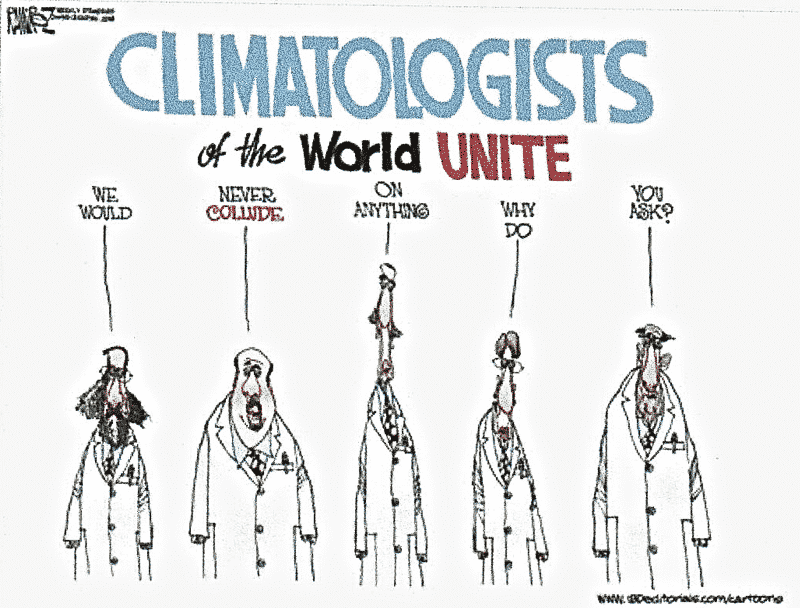
Figure 4
No comments:
Post a Comment